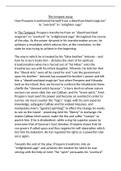The tempest essay
How Prospero transformed himself from a disenfranchised magician”
to “overlord” to “enlighten sage”
In The Tempest, Prospero transforms from an “disenfranchised
magician” to “overlord” to “enlightened sage” throughout the course
of the play. As the power dynamic in his transformation occurs, he
achieves a resolution which returns him, at the conclusion, to the
state he was trying to achieve in the beginning.
The way in which he is treated by his “false brother” Antonio – and
how he in turn treats him – dictates the start of his spiritual
transformation when he is forced out of “his Milan” onto the
treacherous sea with his infant daughter, Miranda. He tells her that
the “liberal Arts” were all he cared for and “cast the government
upon his brother.” Antonio has usurped his brother’s power and left
him a “disenfranchised magician” but when Prospero and Miranda
land on the island, they are forced to confront the inhabitants there:
chiefly the “damned witch Sycorax”; “a born devil on whose nature
nurture can never stick, her son Caliban; and his “brave spirit,” Ariel.
Prospero must exert his power and become an overlord in order to
survive. He must counter the “hag’s” magic with his own superior
knowledge, subjugate Caliban and his wicked impulses, and
manipulate Ariel’s “[gentle] spiriting]” to effect the change he wants
to see on the island – promising Ariel his “liberty” in exchange. He
makes Caliban fetch wood, make the fire and suffer “cramps” to
punish him, if he is disobedient, while using his superior power to
overcome that of Sycorax’s God, Setebos. Prospero shows that he
can govern if called upon and thus negates his self-absorption which
lost him his dukedom. He has regained his rights as a powerful ruler
once again.
Towards the end of the play, Prospero transforms into an
“enlightened sage” and achieves the wisdom for which he was
striving with the help of Ariel. The “spirit” persuades his “overlord”
,to forgive “the three men of sin”, Alonso, Antonio and Sebastian and
tells Prospero “His affections would become tender” if he did so. This
would be Ariel’s course of action if he “were human,” he says. He
also encourages Prospero to “break [his] staff… and drown [his]
books” and “this rough magic [he] abjures.” The implication is that
Prospero, through his suffering and resolution, has achieved the
wisdom and knowledge for which he was striving and can now
luxuriate in this understanding. He has come full circle and has
transformed into the character he was aiming to be. Now he is a
different, wiser ruler.
Through this analysis of Prospero’s relationships with Antonio,
Sycorax, Caliban and Ariel, he has achieved the wisdom for which he
strove and the spiritual insight he craved.
, Theory of flight Essay #2
The novel treats “flight” as a symbol and metaphor for liberation
and self-realisation. Do you agree. Give concrete examples from the
text your point of view.
In The Theory of Flight, “flight” is a symbol and metaphor for
liberation and self-realisation throughout the course of the novel.
Flight is perceived differently by each of the main characters;
however, it is most effectively illustrated by Genie, who on her death
bed “flies away on a giant pair of silver wings.” Golide, “a man
capable of the impossible” achieves his own form of liberation while
The Man Himself, who is threatened by “real revolutionaries,” is
stifled by the idea of freedom. Vida de Villiers demonstrates his idea
of liberation in his artwork “The Theory of Flight: In three
movements”. These characters provide evidence that the idea of
flight in the novel is a symbolic representation of self-realisation and
liberation through the achievement, in different ways, of “the
seemingly impossible”.
In the course of the novel Genie is determined to have “an ending of
[her] own choosing”. This she achieves as she succumbs at the end of
the novel to one of the scourges which provide a major theme in the
Theory of Flight: the suffering resulting from the HIV/Aids pandemic
in this “unnamed country”. She refuses to take her medication and
Vida finds Genie lying in a pool of her own blood, which had made
the outline of the “unnamed country”. Finally, she falls “into a coma”
but her release from earthly suffering comes when she is “seen to fly
away on a giant pair of silver wings”. This epiphany is a symbol of
Genie’s liberty and final realisation as she achieves her desire to
escape becoming just a “statistic”. Genie’s persistent belief that her
parents “did not die” but also “flew away on a pair of silver wings”
shows her ability to transcend the mundane and escape everyday
existence – she achieves “the seemingly impossible” in believing her
parents fulfilled their dreams. This incident also gives credence to




